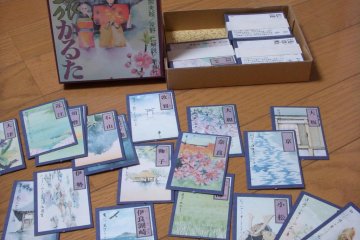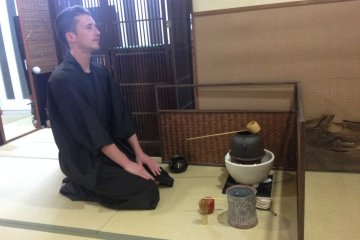Tokyo Tranquility Tea and Incense Ceremony was a magical insight into the art of traditional Japanese tea customs and procedures, with experts who had such admirable knowledge of the history and culture of ‘the way of tea’. It was a pleasure to socialize with these friendly women in colorful, beautiful kimonos and experience the grace of this timeless form of Japanese hospitality. Time froze in this deeply social setting; thin tea, thick tea and special sweets circulated while reflection of the delicate seasonal changes of Japan took place. Tea brings people together, and in a tranquil environment the harmony and sense of spirituality was enchanting.
It all started when being warmly greeted by my teacher Ms. Seki, who explained to me in superb English what would take place. First would be the incense ceremony, followed by thick tea, then by thin tea, all with specially crafted sweets to soften the biter taste of the tea. Finally, I, Daniel-san, would then be the host and make tea for them to drink as my guests.
While the incense procedure was being delicately prepared by Ms. Seki’s colleague, who is a rare individual in studying the ancient art, Ms. Seki began in giving me a fastidiously detailed education into the history of tea gatherings, the weeks and years of preparation that could occur, and how the guests were selected. Around 3-5 was said to be the norm, as this was the easiest number to efficiently manage. A light meal would firstly commence in order to prepare the stomach for the arrival of thick tea, which would be the climax of the tea gathering. Everyone would share one bowl with a feeling of mutual respect and harmony. This would all be done in a peaceful silence, after which two sections would take place. I listened carefully, with Ms. Seki temporarily transporting me into a previous era.
The first section, she explained, was pretty dark, rather dim as the blinds would all be down. There would then be a short intermission when the guests would step out for a few minutes while the setting was changed to a lighter mode. When they returned there would be a scent of incense, which welcomed the guests to purify everything. This is all part of 'the way of tea’.
After Ms. Seki’s colleague prepared the incense with utensils and special charcoal powder, dividing the ash into five sections of lines done for the harmony of yin and yang, the burning commenced and the container was passed around to enjoy the unique smell. Now I would begin to understand the wonderful etiquettes that take place, as Ms. Seki talked me through how to pick up with both hands, place it on my left palm, move it slightly counter-clockwise, make a tunnel with the right hand on the top of the rim, breathe in, smell it and then breathe out to the right three times. During this time one would explain what it was they felt and would try to guess which particular incense it was.
Then came a marvelous and magical moment for myself, as I was to wear a kimono for the first time, a true baptism into Japanese tradition and culture. It was very comfortable and made me feel more submerged into the environment at hand. Once in my kimono, now blending more into the scene of ‘the way of tea’, the tea would then be made.
Here the traditional tea ceremony isn’t just about drinking tea; it is about everything that goes into making the tea and the whole social experience of drinking it. It is about the intricate preparation, where one pours all of their attention and heart into the predefined movements. It is all about the grace and sophistication of how the bowl of tea is prepared, the witnessing of the cultivated aesthetics that the elegantly choreographed ritual possesses.
I find it amazing how artistically a bowl of tea can be made and how much of a spiritual awakening the drinking procedure can be. It makes something simple so special, and really makes you appreciate every moment of the occasion. I also love the process of when the thick tea is served and how everyone drinks from the same bowl. This to me is so good-natured and provides the acknowledgment of how we are all one and equal. Drinking tea is a way of bringing people together but drinking from the same bowl seems to provide an even further bond between guests, where you feel emotionally connected to those who drink with you.
When drinking the thin tea, where it is a bowl per person, I was taught how to make a specific sipping noise to acknowledge to my host that the bowl was finished; yet another wonderful etiquette that is simple but so respectful. I was then told to admire the bowl that I had finished my tea from and appreciate this moment, as it would never happen again. This to me was very spiritualistic and philosophical, and Ms. Seki was certainly right; this moment would truthfully never happen again and I needed to capture it and digest all of its essence.
After eating the specially designed sweets for the season at hand and drinking the teas, I then made tea for Ms. Seki and her two colleagues. When making the tea you really are thrust into the meticulous art form of the preparation, it is one thing just watching it but another gracefully executing the process. As it was my first time it was a little difficult, but thoroughly enjoyable. Sat in a kimono, whisking powdered green tea for my guests, was a moment where I felt more at one with Eastern culture and tradition than I have ever done before.
Unfortunately all good things come to an end, and when the tea was finished I would leave this tranquil setting, but I would leave with a deep understanding of all that is a Japanese tea ceremony. Ms. Seki and her colleagues were extremely warm and friendly, making my first Japanese tea and incense ceremony a truly special one to remember forever. The price of this ceremony is ¥3500 and you can visit the website of Tranquility Tokyo for more details on the schedule and booking information.
















